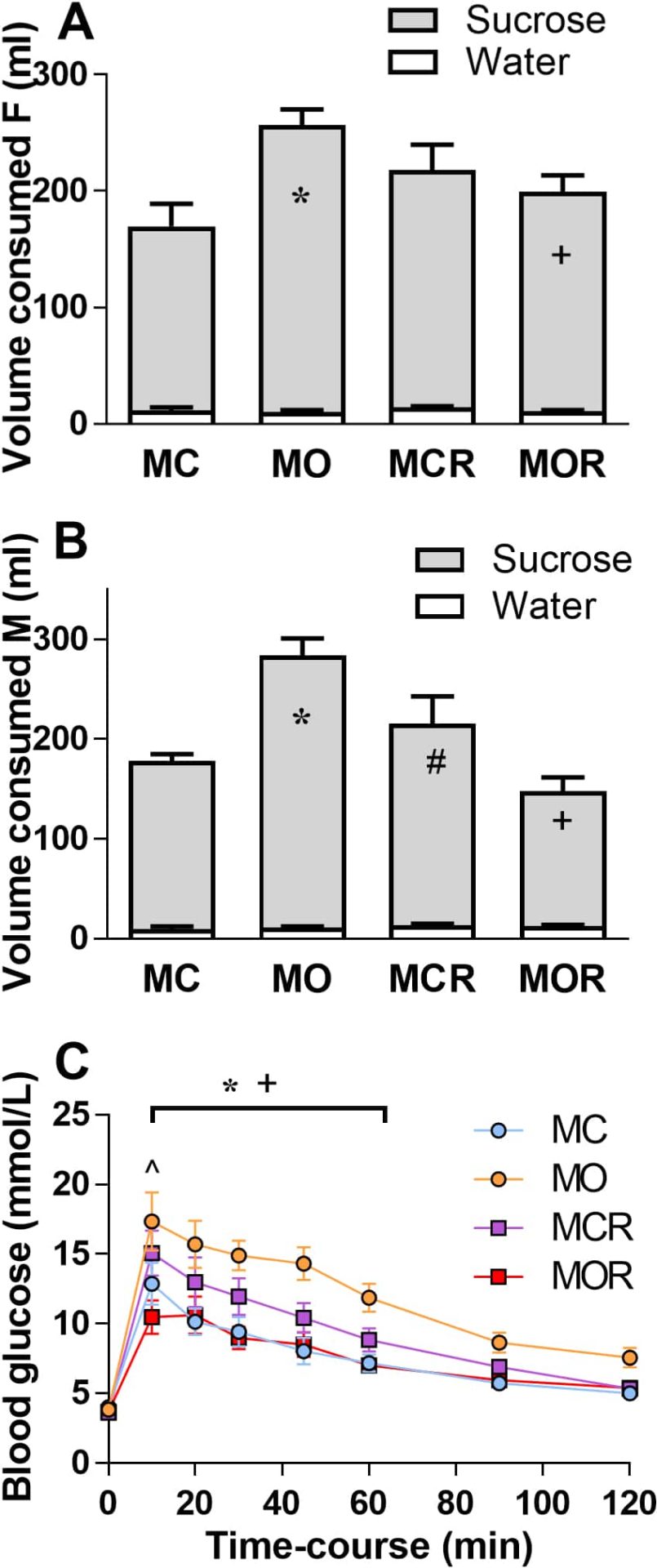Background/Aims: Increasing evidence from epidemiological and animal studies supports maternal obesity during pregnancy as a major risk factor for childhood obesity and cardio-metabolic disease in adulthood. Altered neuroendocrine response to rewarding stimuli may contribute to increased energy intake, culminating to impaired glucose tolerance and/or obesity in later life. Employing an established rodent model of maternal obesity, we hypothesised that resveratrol, a polyphenol with antioxidant properties, would improve offspring metabolic phenotype. The aim of the current study was to determine the effects of resveratrol supplementation pre-pregnancy through to lactation on offspring sucrose preference and glucose tolerance. Method: Female rats (n=10/group) were fed control (C) or obesogenic (O) diet ad libitum from weaning and then supplemented with resveratrol (R, 20mg/kg/d) or vehicle from 90d of age, through mating at 120d, to the end of lactation. Offspring were weaned on to normal chow. One male and one female from each litter (four groups; maternal (M)C, MO, MCR and MOR) was subjected to a sucrose preference test at 40d of age: singly housed rats received two identical bottles each filled with water or sucrose solution (4%) with normal chow ad libitum. The position of the bottles was switched after 24h. Change in body weight and food, water and sucrose consumption were measured after 48h. At 8 months, offspring were subjected to glucose tolerance test (GTT): rats were given a glucose load (2g/kg intraperitoneal) and their blood glucose level was measured at -10, 10, 20, 30, 45, 60, 90 and 120min. Data were calculated as mean±SEM and analysed by Two-way ANOVA with Tukey’s posthoc test. Results: Maternal obesity significantly enhanced offspring intake of sucrose solution (4%) in males and females at 40 days, which were prevented by maternal R (Figure1A and B). No difference was found in water intake. At 8 months, both male (MC:667.3±13; MO:768.2±33* g) and female (MC:341.3±12; MO:397.6±16* g) MO offspring had significantly higher body weight, and MO females displayed a significantly impaired glucose tolerance which was prevented by maternal R (Figure1C). Similar effects were not observed in male offspring. Conclusions: Maternal obesity in pregnancy programmes appetitive behaviour in offspring which promotes the development of obesity in later life. Maternal supplementation with resveratrol throughout pregnancy and lactation prevented the programming of an enhanced sucrose preference in the offspring of obese rat dams and impaired glucose tolerance in the female but not male offspring. The extent to which maternal obesity and resveratrol alters neurodevelopment of the reward pathways of the nucleus accumbens and mechanisms underlying the sexually divergent effect of maternal obesity is the focus of future studies.
Physiology 2019 (Aberdeen, UK) (2019) Proc Physiol Soc 43, C087
Oral Communications: Effect of maternal resveratrol administration on offspring sugar preference and glucose tolerance in a rat model of obese pregnancy
N. Itani1, P. Sethupathi1, T. Perez1, P. W. Nathanielsz2, L. G. Gonzalez-Rodriguez3, E. Zambrano3, P. D. Taylor1
1. Women and Children's Health, King's College London, London, United Kingdom. 2. Wyoming Center for Pregnancy and Life Course Health Research, University of Wyoming, Wyoming, Wyoming, United States. 3. Reproductive Biology Department, Instituto Nacional de Ciencias Médicas y Nutrición Salvador Zubirán, Mexico City, Mexico.
View other abstracts by:
Figure 1. Volume of sucrose solution (4%) and water during a 48h-challenge in (A) males and (B) females at 40 days of age. Blood glucose level following a single dose (2g/kg) of glucose in females at 8 months of age (C). Significant difference * MC vs. MO; + MO vs. MOR; ^ MC vs. MCR; and # MCR vs. MOR (P<0.05,Two-way ANOVA with Tukey post hoc test).
Where applicable, experiments conform with Society ethical requirements.

